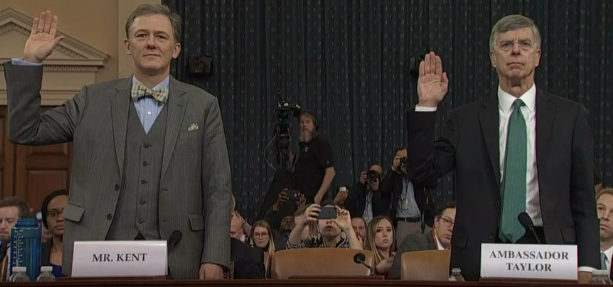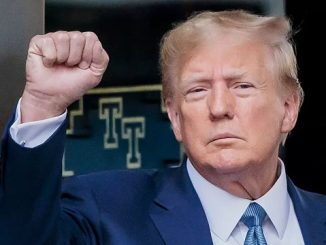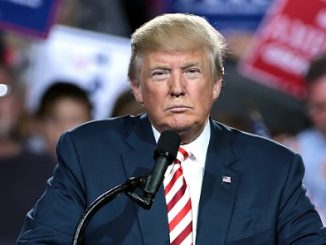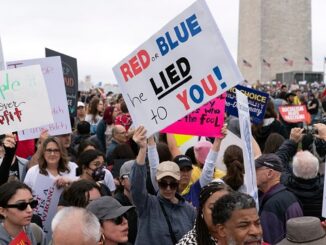
President Donald Trump directly asked about a Ukrainian investigation into his Democratic rival Joe Biden, a top US diplomat has unveiled.
Bill Taylor, the acting ambassador to Ukraine, told an impeachment inquiry that a member of his staff was told Mr Trump was keen to push for the probe.
Mr Trump says he does not recall making the remark. He denies any wrongdoing.
Mr Biden hopes to run against Mr Trump next year. It is illegal to ask foreign entities for help to win an election.
He is accused of withholding US military aid to Ukraine in order to pressure the country’s new president to publicly announce a corruption inquiry into Mr Biden.
Mr Trump has called the inquiry a “witch-hunt”.
What did Trump allegedly ask about?
During a detailed opening statement, Mr Taylor said a member of his staff had overheard a telephone call in which the president inquired about “the investigations” into Mr Biden.
The call was with Gordon Sondland, the US ambassador to the European Union, who reportedly told the president over the phone from a restaurant in Kyiv that “the Ukrainians were ready to move forward”.
After the call, the staff member “asked ambassador Sondland what President Trump thought about Ukraine”, Mr Taylor said.
Mr Taylor said: “Ambassador Sondland responded that President Trump cares more about the investigations of Biden.”
Meanwhile observers and former officials have drawn attention to the security implications of making the call from a restaurant, potentially exposing the conversation to eavesdropping by Russian intelligence.
When asked about Mr Sondland earlier this month, the president had said: “I hardly know the gentleman.”
Responding to queries from reporters after the hearing, Mr Trump said: “I know nothing about that, first time I’ve heard it.”
He said he recalled Mr Sondland’s testimony, in which the diplomat said he spoke to the president “for a brief moment” and Mr Trump had “said no quid pro quo under any circumstances”.
He did not recall the phone call Mr Taylor described, “not even a little bit”, and “in any event it’s more second hand information”, he said.
The impeachment inquiry has been going on for more than a month – but all previous hearings were private, with reports based on leaks and sources speaking to the media.
Wednesday’s public hearings were the first time the public heard from witnesses directly and a chance for Democrats and Republicans to win over voters.
What else happened at the hearing?
Wednesday’s hearing began with testimony from George Kent, a top US diplomat charged with overseeing European affairs.
He told the committee that President Trump’s private lawyer, Rudy Giuliani, ran a “campaign to smear” the US ambassador to Ukraine, Marie Yovanovitch, before she was recalled from her post.
Meanwhile, much of Mr Taylor’s other testimony repeated evidence he gave to private Congressional impeachment hearings, but he added new detail to the accounts in the public domain.
The career diplomat, who has served under Republican and Democratic presidents, reiterated his understanding that the Trump administration threatened to withhold military aid from Ukraine unless the Ukrainian president agreed to publicly announce an investigation into Mr Biden.
He testified that he told Mr Sondland and Kurt Volker, previously the US special envoy to Ukraine, that it would be “crazy” to withhold security assistance for the sake of domestic politics.
Adam Schiff, the Democratic Chairman of the Intelligence Committee overseeing the impeachment inquiry, said the purpose of the inquiry was to establish whether Mr Trump “abused his power and invited foreign interference in our elections”.
“If this is not impeachable conduct, what is?” he added.
The senior Republican on the Intelligence Committee, Devin Nunes, who is a staunch ally of the president, denounced the inquiry as “a televised theatrical performance staged by the Democrats”.
Republicans have been demanding the anonymous whistleblower, who filed a report that eventually triggered the impeachment proceedings, be compelled to give closed-door testimony to the committee.
However, Mr Schiff said he would “do everything necessary to protect the whistleblower’s identity”.
Mr Trump said he was “too busy to watch” the impeachment hearing, although he also tweeted and retweeted several posts about the inquiry on Wednesday.
“I want to find out who’s the whistleblower,” he told reporters after the hearing.
What is Trump accused of?
The US House of Representatives is trying to establish whether Mr Trump abused the power of his office for personal gain.
In a phone call in July, the Republican president asked his Ukrainian counterpart to investigate Democratic White House contender Joe Biden. His son, Hunter Biden, worked for a Ukrainian gas firm while his father was US vice-president.
The US congressional inquiry has already heard that Mr Trump dangled nearly $400m (£327m) in military aid and a White House invitation in order to prod Ukraine’s leader to announce a corruption inquiry that might have caused political embarrassment to Mr Biden.
It is illegal to ask foreign entities for help in winning a US election.
Mr Trump has denied the allegations and branded the impeachment hearings a “phony showtrial”.
What is impeachment?
Impeachment is the first part – the charges – of a two-stage political process by which Congress can remove a president from office. If, following the hearings, the House of Representatives votes to pass articles of impeachment, the Senate is forced to hold a trial.
A Senate vote requires a two-thirds majority to convict and remove the president – unlikely in this case, given that Mr Trump’s party controls the chamber.
Only two US presidents in history – Bill Clinton and Andrew Johnson – have been impeached, but neither was convicted. President Richard Nixon resigned before he could be impeached.
Why the new information matters

This has the potential to be a major twist. Although there have been reports of Mr Sondland’s direct line to the president, there has yet to be evidence tying Mr Trump directly to the alleged quid pro quo.
The phone call Mr Taylor described could change all that.
In the middle of Wednesday’s hearing, the House Intelligence Committee announced a new witness scheduled to give a closed-door deposition on Friday, an aide named David Holmes – reportedly the aide Mr Taylor mentioned.
Next week, Mr Sondland himself is scheduled to testify during public hearings.
If either of these two men support Mr Taylor’s account, it could undercut the president’s defenders who have suggested that Mr Trump was not closely involved in the activities of the “unofficial” channel of Ukraine policy, as Mr Taylor called it, which was pressuring Ukraine to open up investigations into the Bidens.
Democrats have reason to be pleased, while the president’s team has a new set of headaches.
Source: bbc.co.uk






Be the first to comment